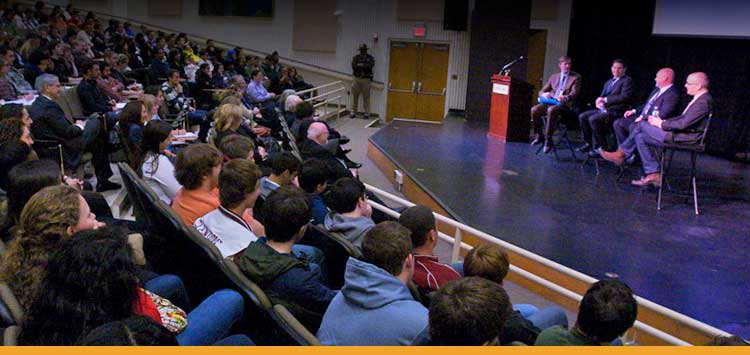Don't Ask, Don't Tell:
10 Years Later
was presented at Hofstra University
September 18, 19, and 20, 2003
2003 marks the 10th anniversary of the existing federal policy authorizing separation of all known gay, lesbian and bisexual Americans from military service. When President Clinton proposed lifting the military's ban of sexual minorities from service in 1993, opponents of the proposal strenuously challenged it on the grounds that the presence of homosexual and bisexual service members would both disrupt military units and risk violence from service members who allegedly harbored unpredictable hostility toward homosexuality. Following intense national debates on the policy into the fall of 1993, the Department of Defense (DoD) promulgated regulations formally limiting inquires into service member's sexuality, and Congress codified longstanding military policy authorizing discharge for known lesbian, gay and bisexual service members, for the first time adding the declaration of a homosexual or bisexual identity as a basis for separation from service. These regulations, in combination, effectively became the policy then known as "Don't Ask, Don't Tell, Don't Pursue."
On September 18, 19, and 20, 2003, Hofstra University hosted a conference on the policy that is now know as "Don't Ask, Don't Tell, Don't Harass," reflecting the DoD's most recent measures to protect service members with "perceived" homosexual or bisexual orientation from harassment and violence within the military. The conference aimed to bring together military experts, legal scholars and historians to discuss the justifications for the current policy, particularly in light of the last 10 years of American experience in implementing and adjusting to the policy. The conference also focused on issues faced by ROTC, and examined how colleges and universities have tried to support the military on campus while opposing the discrimination embodied in "Don't Ask, Don't Tell." The conference report should serve as a significant, comprehensive assessment of the policy, both for today and for future study.
For a complete listing of panels and events that took place at the conference read the Final Program.
For more information please contact:
Conference Director:
Eric Lane
Distinguished Professor of Public Law and Public Service
Hofstra University School of Law
Tel: (516) 463-5886
Fax: (516) 463-4800
Send an Email
Hofstra Cultural Center
200 Hofstra University
Hempstead, NY 11549
Tel: (516) 463-5669
